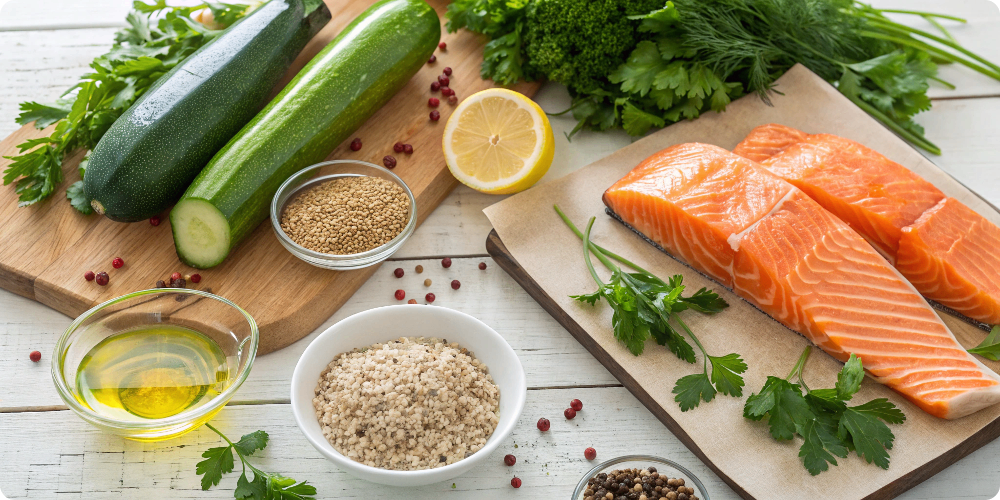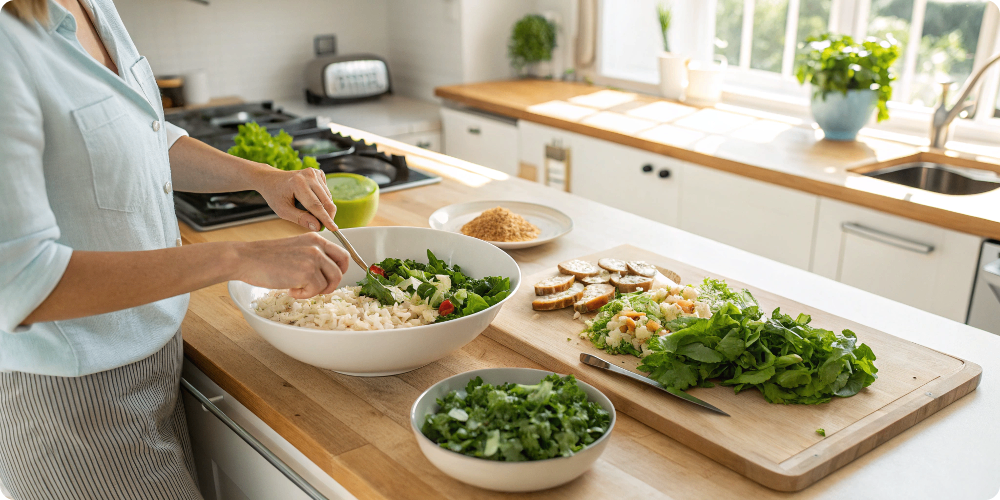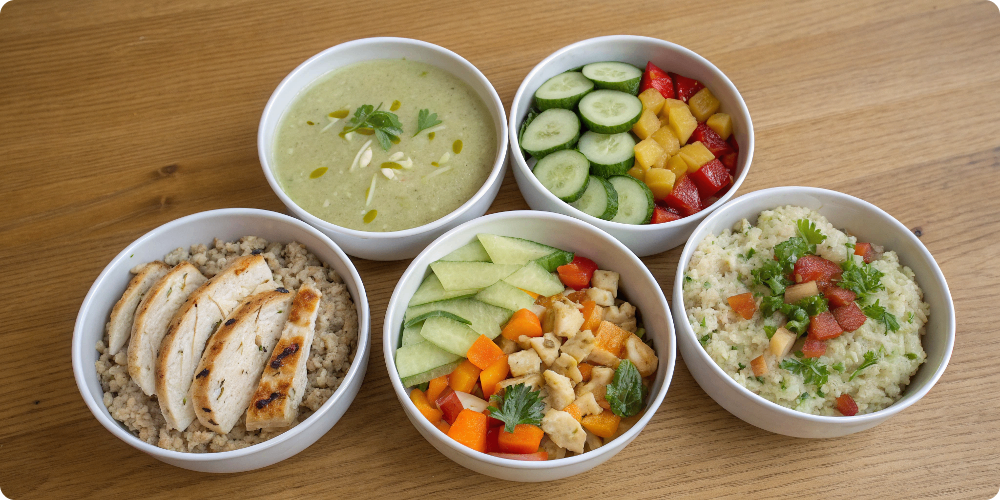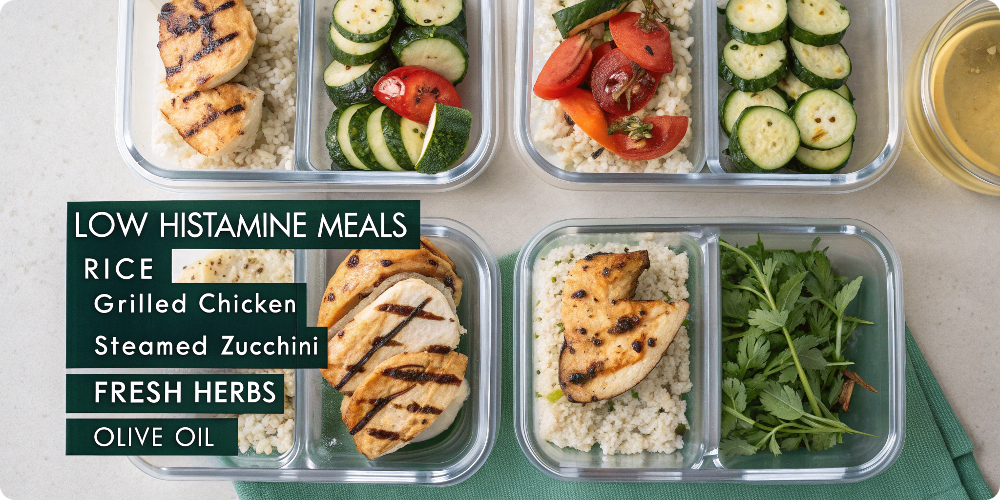Low Histamine Recipes
Low Histamine Recipes: Fresh, Nourishing Meals That Support Wellness
If you’ve ever felt bloated, foggy, or off after eating certain foods, even healthy ones, you’re not alone. Many people are discovering that histamine intolerance may be the hidden cause behind their symptoms. The good news? You don’t need to sacrifice flavour or joy in your meals. These low histamine recipes focus on fresh ingredients, gentle flavours, and a little help from Chef Rachael, who’s passionate about food that makes you feel good.
At Tasty Plated, we believe food should nourish, not complicate. Whether you’re managing histamine sensitivity or just trying to eat clean, this guide offers simple recipes, helpful swaps, and original tips to help you cook with care and confidence.
• What Are Low Histamine Recipes and Who Needs Them?
Let’s break it down. Histamine is a chemical your body produces naturally, but it’s also found in many foods especially aged, fermented, or processed items. For some people, histamine builds up faster than the body can break it down, leading to symptoms like headaches, fatigue, hives, or digestive upset.
Low histamine recipes focus on using:
-
Fresh, minimally processed ingredients
-
Simple cooking methods like steaming, roasting, or sautéing
-
Gentle seasonings that support gut balance
These meals aren’t just “safe” they can also be deeply satisfying, colourful, and full of flavour when done right.

• Common Triggers: What to Avoid on a Low Histamine Diet
Understanding what to cut back on is just as important as knowing what to include. Chef Rachael always recommends a gentle elimination approach, rather than cutting everything at once.
Common high-histamine triggers:
-
Aged cheeses
-
Cured meats (like salami or bacon)
-
Fermented foods (sauerkraut, kombucha, soy sauce)
-
Alcohol and vinegar
-
Canned fish or seafood
-
Tomatoes, spinach, and eggplant
-
Leftovers that sit too long in the fridge
Many of these foods are nutritious in other contexts, but for someone with histamine sensitivity, they can cause flare-ups.
• Ingredients You Can Count On
Instead of focusing on the “don’ts,” let’s talk about what you can enjoy and trust us, it’s a lot more than just plain rice and chicken.
Chef Rachael’s favorite low histamine staples:
-
Fresh proteins like chicken breast, white fish, or turkey
-
Whole grains like rice, millet, quinoa, and oats
-
Fresh herbs like parsley, thyme, and basil (skip dried versions)
-
Low-acid veggies like zucchini, carrots, and cucumbers
-
Fats from olive oil, ghee, and coconut oil
-
Fruit like apples, pears, blueberries, and mango
-
Baking staples like maple syrup, coconut milk, and cassava flour
Keeping meals simple, fresh, and lightly seasoned can make all the difference.
• Chef Rachael’s Approach to Cooking Low Histamine at Tasty Plated
When Chef Rachael began experimenting with low histamine recipes, her main goal was to keep them from tasting like “diet food.” She focused on building flavour from fresh herbs, slow cooking, and natural pairings.
“I want people to feel comforted, not restricted. Cooking low histamine isn’t about what you can’t eat, it’s about finding what works for your body,” she says.
Her key strategies:
-
Use fresh lemon zest or herbs instead of citrus or vinegar
-
Roast vegetables with olive oil and thyme for depth
-
Add richness with a touch of ghee or coconut milk
-
Keep meals light and easy to digest
-
Avoid overcooking or storing meals too long (histamine rises with time)

• Table: High vs Low Histamine Foods at a Glance
| Food Category | High Histamine Examples | Low Histamine Alternatives |
|---|---|---|
| Protein | Aged meats, canned fish, shellfish | Fresh chicken, turkey, cod, trout |
| Vegetables | Spinach, tomatoes, eggplant | Zucchini, carrots, sweet potatoes |
| Grains | Fermented breads, sourdough | White rice, quinoa, millet |
| Dairy | Aged cheese, yogurt | Fresh cream, non-dairy milks (coconut, oat) |
| Seasonings | Soy sauce, vinegar, ketchup | Olive oil, fresh herbs, garlic oil |
| Beverages | Alcohol, kombucha | Herbal teas, coconut water, filtered water |
• 5 Easy Low Histamine Recipes You Can Make Today
These aren’t fancy or complicated just real food with smart ingredient choices.
1. Zucchini & Quinoa Bowl
Roasted zucchini, quinoa, fresh parsley, and olive oil with a sprinkle of salt.
2. Coconut Rice Porridge
Cook white rice in coconut milk with a touch of maple syrup. Top with pear slices.
3. Baked Herb Chicken with Millet
Marinate chicken in olive oil and thyme, then bake. Serve with fluffy millet and carrots.
4. Cucumber & Apple Salad
Thinly sliced cucumber, green apple, and parsley with a drizzle of olive oil.
5. Root Vegetable Soup
Carrots, sweet potatoes, and zucchini simmered in bone broth (if tolerated) or water with herbs.

• How to Batch Cook and Store Low Histamine Meals Safely
Meal prep can be tricky when managing histamine, since leftovers can cause histamine levels to rise over time. But it’s not impossible.
Chef Rachael’s Prep Tips:
-
Cool meals quickly after cooking
-
Store in glass containers
-
Eat within 24 hours or freeze right away
-
Avoid reheating multiple times
-
Use labels with prep dates to keep track
She also recommends prepping building blocks, like cooked rice, chopped veggies, or portioned proteins that can be combined fresh at each meal.

• FAQs About Low Histamine Recipes and Meal Prep
1. Do I need to avoid all high histamine foods forever?
Not necessarily. Many people reintroduce foods once symptoms improve. Work with a doctor or nutritionist for guidance.
2. Can I eat leftovers?
Only if they’ve been cooled and stored properly. The fresher, the better.
3. Is this the same as an anti-inflammatory diet?
There’s overlap, but a low histamine diet is more specific. Still, both focus on clean, whole foods.
4. Can I eat out at restaurants?
It’s tricky. Stick to plain proteins, steamed veggies, and simple sides. Call ahead if possible.
5. What’s a good low histamine snack?
Fresh fruit, rice cakes with olive oil, or homemade oat cookies using coconut flour.
6. What if I mess up and eat something high in histamine?
It’s okay. Be kind to yourself. Stay hydrated, rest, and reset with your next meal.
• Final Thoughts: Cooking with Calm, Confidence, and Care
Eating for your health shouldn’t feel like punishment. These low histamine recipes are a reminder that simple food can still be beautiful, flavourful, and deeply nourishing. With the right ingredients, a bit of planning, and Chef Rachael’s gentle guidance, you can eat in a way that supports your body and feels good, not stressful.
You’re not just managing a food list. You’re learning to listen to your body, honor your needs, and create meals that heal.
And if you’re looking for more inspiration, Tasty Plated is here to help, one calm, delicious recipe at a time.